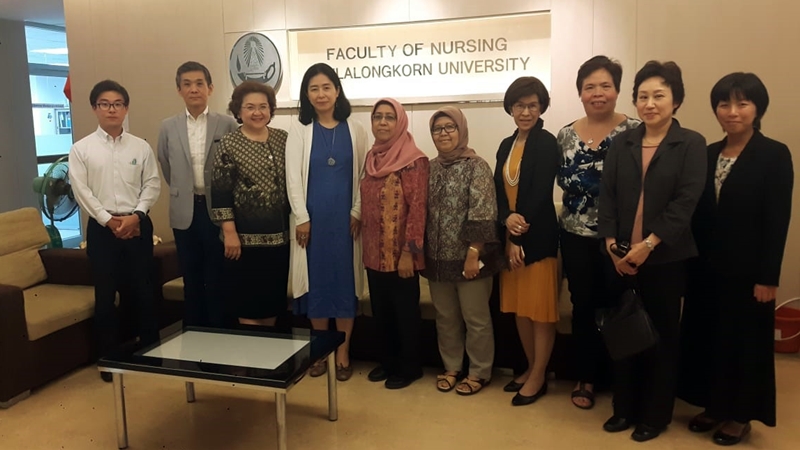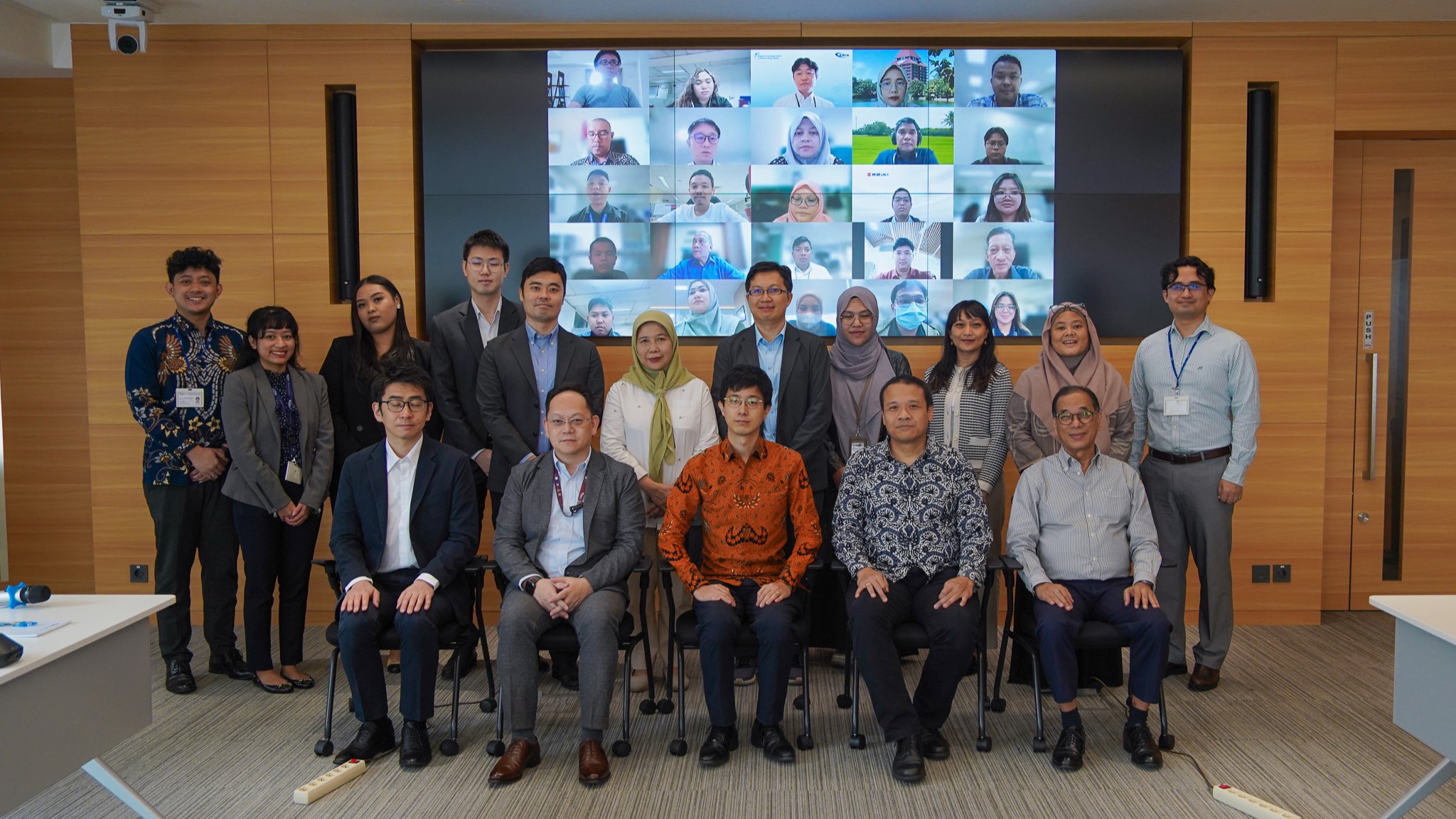ERIA and IDE-JETRO Organise Workshop on Human Resource for Health and Elderly Care in Asia
Date:
10 September 2018Category:
NewsTopics:
HealthcareShare Article:
Print Article:
Bangkok, 3 September 2018: The first workshop of ERIA and IDE-JETRO Collaborative Research Project on ‘Human Resource for Health and Elderly Care in Asia’ was held in Chulalongkorn University, Bangkok on 3 September 2018.
The workshop was attended by participants from Faculty of Nursing of Chulalongkorn University, College of Population Studies of Chulalongkorn University, Centre of Population Studies of Indonesian Institute of Science, College of Policy Science of Ritsumeikan University, Faculty of International Studies of Ryukoku University, and IDE-JETRO.
In their welcome remarks, Dr Yuko Tsujita, Senior Research Fellow of IDE-JETRO Bangkok and Mr Sota Machida, ERIA’s Senior Officer of Healthcare and Long-term Care Policy, made a brief introduction about the workshop. On behalf of ERIA, Mr Machida explained that ERIA was established with the mandate to make policy recommendations to East Asia, particularly ASEAN. He also explained about the Healthcare Unit of ERIA which was launched in 2017 in response to Asia Health and Human Wellbeing Initiative (AHWIN) of the Government of Japan. In accordance with this initiative, as well as ERIA’s missions, ERIA is willing to collaborate with international and local institutions on ageing-related issues.
This research project is expected to reveal the challenges which limit the movement of nurses and care workers in the region, and to achieve the outcomes that will contribute to human resource development and proper employment of cross-border nurses and care workers.
In the beginning of the discussion, they talked about the international mobility of nurses within ASEAN countries under mutual recognition agreements (MRAs). This agreement was signed in 2006 with the aim of facilitating the mobility of nursing services professionals, enhancing the exchange of expertise and providing the capacity building of nurses within ASEAN member states. The MRA for nursing professionals is part of the effort of ASEAN member States in recognising ASEAN Vision 2020.
Dr Tsujita delivered her presentation on her joint-research with Prof Hisaya Oda, Ritsumeikan University. This study focuses on foreign-trained nurses in Malaysia. Prof Oda also gave a presentation on his study, titled ‘Analysis of Nurses’ Intention to Migrate abroad: A Case of Tamil Nadu, India’. This study discloses the story of India as the biggest supplier of cross-border nurses and discusses the possibility of Japan receiving Indian nurses and care workers in the near future.
Researchers of the Indonesian Institute of Sciences (LIPI) discussed their study on the migration and career development of Indonesian nurses. They reported that nurse migration abroad results in the shortage of local nurses and uneven distribution of nurses in Indonesia. They tried to collect the data on the career paths of the graduate of several Indonesian nursing schools in cooperation with the alumni associations of those schools. However, according to their earlier survey, most nursing schools did not have any record of the graduates’ career paths, and what they could rely on was information gained from social media sites such as Facebook. They asserted that the favourable conditions such as high salary and more opportunity for knowledge improvement lure Indonesian nurses with the enthusiasm and passion for promotion. For the next step, they will get in touch with other Indonesian institutions that may have the updated data of the career paths of Indonesian nurses.
Prof Patcharawalai Wongboonsin from College of Population Studies, Chulalongkorn University, delivered a presentation on the ‘Demographic Transition and Policy Responses’ in ageing society in Thailand. She discussed the Thai government’s current policies to promote the welfare of the elderly and to build a comprehensive system to make their lives more convenient. Through her study in Thailand as part of this project, she intends to make recommendations for improving the skills of nurses and caregivers who work in elderly care. This could support the provision of good quality elderly care in Thailand. Her study will be divided into three levels: national, community, and individual level. Dr Yupin Aungsuroch from Faculty of Nursing, Chulalongkorn University, provided the overview of human resources for elderly care in Thailand. Ms Naomi Hatsukano, Associate Senior Research Fellow of IDE-JETRO, a co-investigator of this study, will carry out some field surveys at nursing homes around Thailand. At the beginning of the survey, she found that the definition of caregiver in Thailand is the person who has finished 6 months-training courses after they graduate from senior high school or junior high school and is recruited directly by nursing home.
The last presentation was made by Prof Reina Imaizumi and Ms Yurika Suzuki on Filipino care workers in Japan. There are 4 (four) pathways for the Filipino to work as care workers in Japan: (1) under EPA programme, (2) schools which facilitate certification programmes for caregivers, (3) under Technical Intern Trainee Programme, and (4) persons with Japanese ancestry. As of the end of 2017, approximately only 600 EPA care worker candidates from about 3,490 examinees from the Philippines, Indonesia, and Viet Nam passed the national exam for certified caregivers; however, almost 30% of those who passed the exam returned to their home country. This unexpectedly high turnover of EPA caregivers mostly resulted from the first three pathways. This study is expected to find which pathway can be favoured by Filipino care workers who have the potential to fulfil the need of Japan’s labour market for care industry.
This workshop was designed to provide the first opportunity for all the project members to come together and discuss their study plans. At the end of the workshop, project members agreed to sum up the outcomes in a book which consists of 4 chapters. The chapters will cover the following topics: ‘Indonesia as a nurse-sending country’, ‘Malaysia as a nurse-receiving country from India and other countries’, ‘Human resources for elderly care and the policy on ageing in Thailand’ and ‘Japan as a caregiver-receiving country (Caregivers from the Philippines)’.







